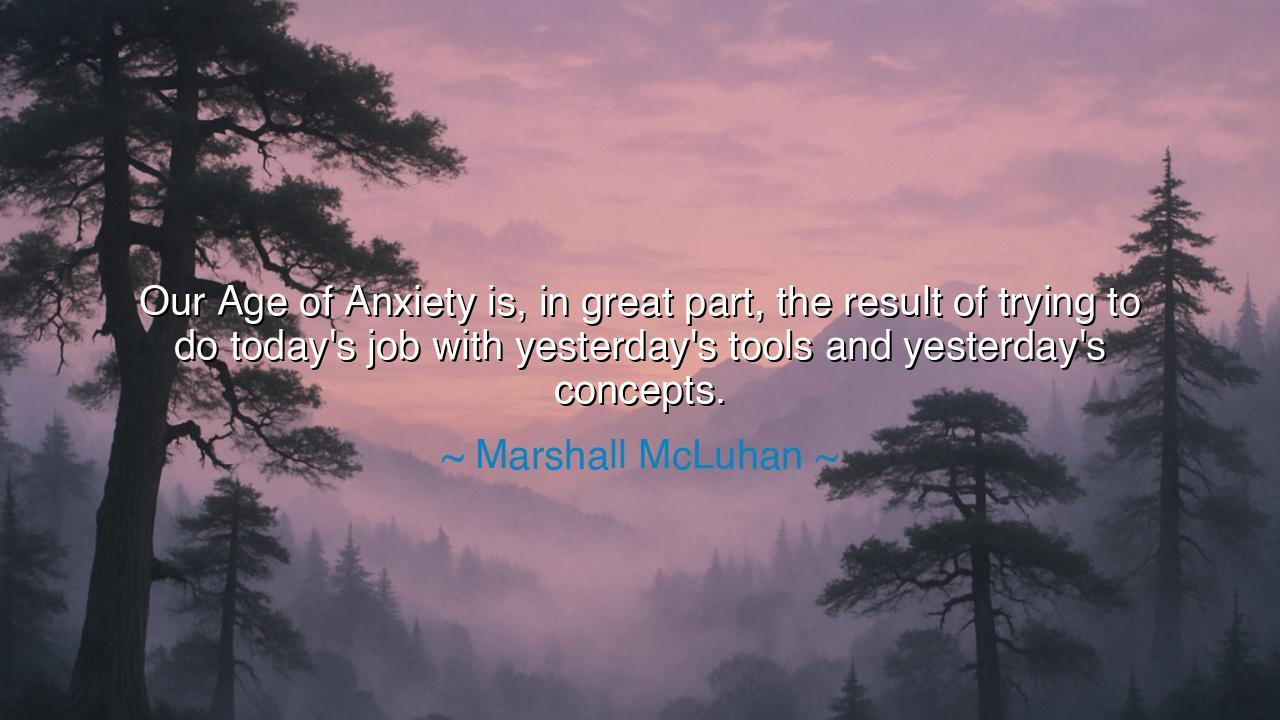
Our Age of Anxiety is, in great part, the result of trying to do
Our Age of Anxiety is, in great part, the result of trying to do today's job with yesterday's tools and yesterday's concepts.






"Our Age of Anxiety is, in great part, the result of trying to do today's job with yesterday's tools and yesterday's concepts." These profound words, spoken by Marshall McLuhan, offer a sharp critique of the way in which human beings often cling to outdated methods and ideas while facing the challenges of a rapidly changing world. McLuhan’s insight speaks directly to the tension we feel in the modern age—a sense of anxiety that arises not only from the complexity of the world around us but from our failure to adapt to the new tools and concepts that have emerged to help us navigate it. In our efforts to live in a modern world, we often find ourselves trapped by old paradigms, attempting to apply ancient methods to new challenges, and in doing so, we breed confusion and frustration.
In the ancient world, the concept of change and adaptation was also deeply recognized. The Greeks, for example, constantly sought wisdom through both rational thinking and experience. The transition from the age of mythological thinking to philosophical reason was marked by great figures like Socrates, Plato, and Aristotle, who understood that the world must be understood through evolving concepts and new ways of thinking. They did not simply accept the ideas of their predecessors but were constantly refining their understanding of ethics, nature, and society. Just as McLuhan observed, they knew that the world could not be understood through the tools of their ancestors—ideas needed to evolve with the times to meet the changing conditions of life.
Consider, for instance, Heraclitus, the ancient philosopher who famously stated, "You cannot step into the same river twice." Heraclitus saw that change was the only constant in life, and to navigate it successfully, one must embrace the fluidity of the world. McLuhan’s statement echoes this ancient wisdom—the anxiety we face today is the result of our inability to let go of outdated tools and concepts, trying to make sense of a world that, like the river, is always flowing and shifting. To cling to the past in the face of a world that demands new thinking is like trying to row upstream with the old, broken oars of yesterday.
Throughout history, great leaders and innovators have understood the necessity of embracing the new and adapting to the world as it evolves. Consider the example of Leonardo da Vinci, whose genius lay not just in his mastery of the past, but in his ability to innovate. While the Renaissance celebrated the rediscovery of ancient knowledge, it was Leonardo who propelled humanity forward by merging the wisdom of the past with the new ideas of his time. His exploration of science, anatomy, and engineering set the stage for modern thought, demonstrating that progress comes from not only honoring the past but building upon it with new ideas and methods. Like McLuhan, Leonardo understood that the world of his day could not be understood by using the old tools of medieval thinking.
In the modern age, McLuhan saw that our world had entered a new era—one of technology, globalization, and complex systems—yet our thinking often remained mired in old concepts. This is the source of the anxiety McLuhan speaks of. The Industrial Revolution, for example, introduced unprecedented technological change, but the society of that time was still operating under the old systems of feudalism and agriculture. Similarly, the rise of the digital age has created profound shifts in how we communicate, work, and live, yet we continue to apply the old models of education, business, and governance, which were built for a world that no longer exists. McLuhan's insight shows that our inability to update our methods for the modern world is a source of the anxiety that many of us experience today.
The lesson in McLuhan’s words is clear and urgent: to thrive in the modern world, we must not only recognize the changes around us but actively adapt to them. As the ancients taught, to grow and flourish, we must evolve with our environment. The wisdom of the past is valuable, but it must be integrated with the tools and concepts of today. The concepts and tools that helped us navigate yesterday’s world may no longer serve us in the present, and clinging to them in the face of the new creates tension, stress, and confusion.
In practical terms, this means that we must embrace change—not fear it. Just as Socrates questioned the beliefs of his time, we too must question the assumptions and methods that we’ve inherited, and find new ways to address today’s challenges. We must be willing to invest in learning, adaptation, and innovation. Whether in our work, relationships, or society, we must seek new tools, new concepts, and new approaches that align with the current needs of our world. Like Leonardo da Vinci, we must bring together the wisdom of the past and the possibilities of the future, using them to create a world that is not just survivable but thriving and progressive.
Let us, then, take McLuhan's wisdom to heart. Let us recognize that anxiety in our time arises not from the complexity of the world, but from our failure to adapt to it. By embracing new ideas, by updating our tools and methods, we can move forward with confidence, knowing that we are not beholden to the past, but are shaping our world in real-time. Let the age of anxiety give way to an age of innovation, where we grow through adaptation, and where each new idea and action brings us closer to a life of purpose and peace.






AAdministratorAdministrator
Welcome, honored guests. Please leave a comment, we will respond soon